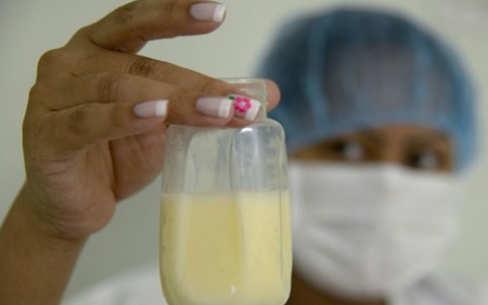(单词翻译:单击)
Cambodia officially banned selling and exporting locally-pumped human breast milk last Tuesday, after reports exposed how women were turning to the controversial trade to boost meagre incomes in one of Southeast Asia's poorest countries.
上周二,柬埔寨正式禁止销售和出口当地母乳。此前有报道披露,在这个东南亚最贫穷的国家之一,有女性通过出口母乳这项有争议的贸易,来获得微薄的收入。
The order comes after Cambodia temporarily halted breast milk exports by Utah-based Ambrosia Labs, which claims to be the first firm to source the product from overseas and distribute it in the United States.
此前,柬埔寨临时暂停了母乳出口业务,该业务主要由美国犹他州一家名为Ambrosia Labs的公司经营。据称它是美国第一家从海外采购母乳并其分发到美国的公司。在此之后,柬埔寨就颁布了该禁令。
The milk was pumped by poor Cambodian women in the capital Phnom Penh and then shipped to the US, where it was pasteurised and sold for $20 per 5 oz (147 ml) pack.
这些母乳来自柬埔寨首都金边的贫穷妇女,然后运往美国,在那里经过巴氏消毒,最终以每5盎司(147毫升)20美元的价格售出。
The company's customers are American mothers who want to supplement their babies' diets or cannot produce enough milk of their own.
该公司的销售对象是美国的妈妈们,她们想要增加婴儿的饮食或是没有足够的母乳。

Last Tuesday, Cambodia's cabinet ordered the health ministry to "take actions to immediately prevent the purchasing and exporting of breast milk from mothers from Cambodia".
上周二,柬埔寨内阁命令卫生部“立即停止柬埔寨的母乳采购和出口”。
"Although Cambodia is poor and (life is) difficult, it is not at the level that it will sell breast milk from mothers".
“虽然柬埔寨很贫穷,生活很困难,但是还不至于到需要妈妈们卖母乳这种水平。”
Ambrosia Labs has defended its business in previous interviews, saying the model encouraged Cambodian women to continue breast feeding, earned them much needed extra income and helped fill milk bank shortages in the US.
在之前的采访中,美国Ambrosia Labs公司捍卫了自己的业务,并表示,该模式鼓励柬埔寨妇女继续哺乳,挣得更多的收入,同时帮助缓解美国母乳短缺的问题。
But UNICEF -- the arm of the UN protecting children -- welcomed the ban, saying the trade was exploitative and that excess breast milk should remain in Cambodia, where many babies lack proper nutrition.
但是联合国儿童基金会对这项禁令表示赞成,谴责这种贸易是剥削式的,并称柬埔寨许多婴儿缺乏适当的营养,过剩的母乳应该留在柬埔寨。
"In Cambodia exclusive breastfeeding for newborns for their first six months declined from 75 per cent in 2010 to 65 per cent in 2014," Debora Comini, UNICEF's Cambodia Representative said in a statement.
联合国儿童基金会驻柬埔寨代表黛伯拉·科米尼在一份声明中说道:“柬埔寨新生儿纯母乳喂养的比例,也从2010年的75%降到了2014年的65%。”


